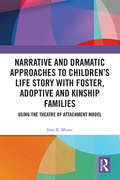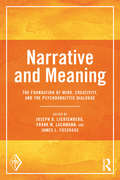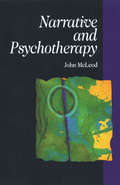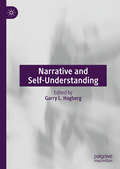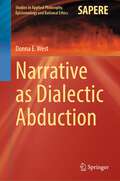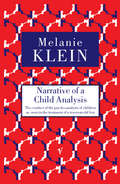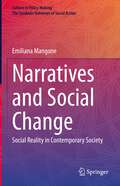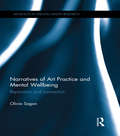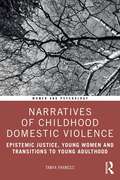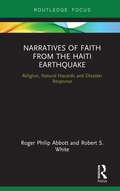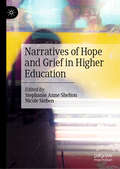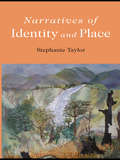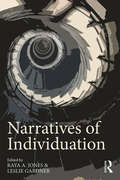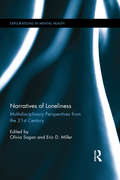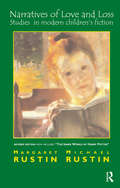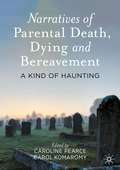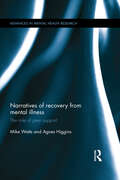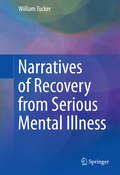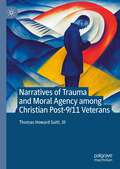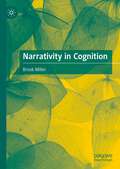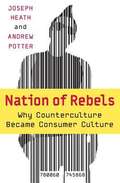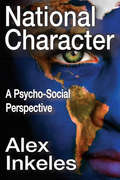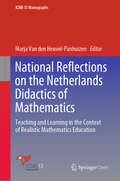- Table View
- List View
Narrative and Dramatic Approaches to Children’s Life Story with Foster, Adoptive and Kinship Families: Using the ‘Theatre of Attachment’ Model
by Joan MooreNarrative and Dramatic Approaches to Children’s Life Story with Foster, Adoptive and Kinship Families outlines narrative and dramatic approaches to improve vulnerable family relationships. It provides a model which offers new ways for parents to practise communicating with their children and develop positive relationships. The book focuses on the Theatre of Attachment model - a highly innovative approach which draws from a strong theoretical base to demonstrate the importance of narrative and dramatic play for sharing the children’s life history in the family home with their adoptive, foster or kinship parents. An emphasis is on having fun ways to work through complex feelings and divided loyalties, so as to secure attachment. This practice model aims to raise children’s self-esteem and communication skills and to combat the profound effects of abuse, neglect on trauma on children’s development. This book will be of great interest for academics, post-graduate students, universities and Training bodies, service providers and practitioners involved in social work and creative therapies, child psychologists, child psychotherapists and public and private adoption and foster care agencies.
Narrative and Meaning: The Foundation of Mind, Creativity, and the Psychoanalytic Dialogue (Psychoanalytic Inquiry Book Series)
by Joseph D. Lichtenberg, Frank M. Lachmann, and James L. FosshageNarrative and Meaning examines the role of both in contemporary psychoanalytic practice, bringing together a distinguished group of contributors from across the intersubjective, relational, and interpersonal schools of psychoanalytic thought. The contributions propose that narratives or stories in a variety of non-verbal and verbal forms are the foundation of mind, creativity, and the clinical dialogue. From the beginning of life, human experience gains expression through the integration of perception, cognition, memory and affect into mini or complex narratives. This core proposal is illustrated in chapters referencing creativity, psychoanalytic process, gesture, and sensory-motor activity, dreams, music, conflicting narratives in couples, imaginative stories of adopted children, identity, and individuality. Including a major revision in theory based upon an expanded definition of narrative, this book is an essential read for any contemporary psychoanalyst wishing to use narrative in their practice. Featuring essential theory and a wealth of practical clinical material, Narrative and Meaning will appeal greatly to both psychoanalysts and psychoanalytic psychotherapists.
Narrative and Psychotherapy: Practice, Theory And Research
by John McLeodThe core of psychotherapy can be seen as a process in which the client comes to tell, and then re-author, an individual life-story or personal narrative. The author of this book argues that all therapies are, therefore, narrative therapies, and that the counselling experience can be understood in terms of telling and retelling stories. If the story is not heard, then the therapist and the client are deprived of the most effective and mutually involving mode of discourse open to them. Taking a narrative approach also requires thinking about the nature of truth, the concept of the person, the relationship between therapist and client, and the knowledge base of psychotherapy. John McLeod examines the role and significance of stories in psychotherapy from within a broad-based cultural and theoretical framework.
Narrative and Self-Understanding
by Garry L. HagbergThis exciting new edited collection bridges the gap between narrative and self-understanding. The problem of self-knowledge is of universal interest; the nature or character of its achievement has been one continuing thread in our philosophical tradition for millennia. Likewise the nature of storytelling, the assembly of individual parts of a potential story into a coherent narrative structure, has been central to the study of literature. But how do we gain knowledge from an artform that is by definition fictional, by definition not a matter of ascertained fact, as this applies to the understanding of our lives? When we see ourselves in the mimetic mirror of literature, what we see may not just be a matter of identifying with a single protagonist, but also a matter of recognizing long-form structures, long-arc narrative shapes that give a place to – and thus make sense of – the individual bits of experience that we place into those structures. But of course at precisely this juncture a question arises: do we make that sense, or do we discover it? The twelve chapters brought together here lucidly and steadily reveal how the matters at hand are far more intricate and interesting than any such dichotomy could accommodate. This is a book that investigates the ways in which life and literature speak to each other.
Narrative as Dialectic Abduction (Studies in Applied Philosophy, Epistemology and Rational Ethics #64)
by Donna E. WestThis book presents a fresh approach to the communicability of narratives, revealing the cognitive underpinnings of Charles Sanders Peirce’s pragmatistic model. It demonstrates how abductive processes modify habits of belief and action in what Peirce refers to as double consciousness. Abductions generated during double consciousness paradigms have increased efficacy compared to instinctual abductions. Novel inferences from working memory become consciously integrated with existing long-term memory units which permits fuller consideration of the plausibility of propositions. Special attention is given to children’s prelinguistic means to represent propositional or assertory conflicts, and to resolve these conflicts via listening and re-telling narrators’ accounts. Overall, this book serves both a theoretical and applied purpose. It is intended to support innovative therapeutic interventions to facilitate the (re)construction of narratives by adults and children. Its practical applications and theoretical grounding will appeal to graduate students and scholars alike, who wish to examine narrative as an interdisciplinary enterprise—an ontological and cultural phenomenon (narration by way of action/image sequences), not just a literary/linguistic paradigm. Ultimately, this account presents narrative as a modal forum to resolve logical and practical conflicts, compelling the interpreter to become an involved partner in the narrated event itself.
Narrative of a Child Analysis: The Conduct of the Psycho-analysis of Children as Seen in the Treatment of a Ten Year Old Boy
by Melanie KleinMelanie Klein gives a detailed account of the analysis of a ten year old boy, Richard. Klein describes the day to day course of the analysis interpreting Richard`s drawing, play, verbal associations and reports of dreams. Also included is the reproduction of the drawings made by the patient, the analysis of which is elaborated in this text. This fascinating and deeply instructive case study shows the fluctuations which characterise a psycho-analysis and reveals the dynamics of the steps which eventually lead to progress in treatment. In a series of notes accompanying the clinical description, Melanie Klein comments upon the clinical material, linking the actual instances to more theoretical conclusions. In doing so, she has provided an invaluable guide to the technique of psycho-analysing children.
Narratives and Social Change: Social Reality in Contemporary Society (Culture in Policy Making: The Symbolic Universes of Social Action)
by Emiliana MangoneThis book is an important contribution to narrative research and highlights how narratives can produce social change. The author demonstrates this through an analysis of concepts like future, uncertainty and risk, both in terms of individual impact and as collective forms of social life. The book reconstructs the relationships between future, uncertainty and risk through everyday how narratives exert power over individual and social life by influencing individual or collective decisions and choices. Narratives also change future prospects, thus producing social change. Some of the examples the author draws out for discussion are - in specific - the narration of the migration flows in the Mediterranean Sea, and the narration of the pandemic emergency from COVID-19. The result of different narratives has been the emergence of new ideologies and of a complex series of dynamics in which the local ends up becoming global and vice versa. Highly topical and interdisciplinary in its approach, this book is of interest to researchers and students of the sociology of culture and communication, media and communication studies, social and cultural psychology and cultural anthropology.
Narratives of Art Practice and Mental Wellbeing: Reparation and connection (Advances in Mental Health Research)
by Olivia SaganNarratives of Art Practice and Mental Wellbeing draws on extensive research carried out with mental health service users who are also practicing artists. Using narrative data gained through hours of reflective conversation, it explores not whether art can contribute to positive wellbeing and improved mental health - as this is now established ground - but rather how art works, and the role art making can play in people’s lives as they encounter crises, relapse, recovery or ‘beyonding’. The book maps the delicate ways in which finding a means to tell our story sometimes is the creative project we seek, and offers a reminder of how intrinsically linked our life trajectories are with creative opportunities. It describes the wide range of artistic activity occurring in health and community settings and the meanings of these practices to people with histories of mental turbulence. Drawing on psychoanalytic theory, the book explore the stories and various forms of visual arts practices spoken of, and considers the art making processes, the creative moments and the objects which in some cases have changed people’s lives. The seven chapters of the book offer a blend of personal testimony, theory, debate, critique and celebration, and examine key topics of deliberation within the fields of art therapy, arts in health, community arts practice, participatory arts, and widening participation within arts education. It will be valuable reading for researchers, students, artists and practitioners in these fields.
Narratives of Childhood Domestic Violence: Epistemic Justice, Young Women and Transitions to Young Adulthood (Women and Psychology)
by Tanya FrancesNarratives of Childhood Domestic Violence explores young women’s accounts of transitions to young adulthood after domestic violence in childhood, from a psychological perspective.This book centres a dialogue about epistemic justice and how experiences of violence that are marginal, marginalised, and less easily understood through dominant discourses can be listened to and heard. Taking a critical feminist psychological approach, Frances examines gendered and socio-culturally located narrative practices, arguing that narratives about change and transition in young adulthood after childhood domestic violence both re-inscribe societal narratives that can be constraining and present stories of resistance and hope. This book draws attention to the difficulties of being heard and understood when articulating an experience that sits in tension with normative expectations and trajectories for families and children growing up within them. It also examines how tensions in storytelling practices are articulated in creative, nuanced and diverse ways. Frances ends the book by offering considerations for theory, research and practice, including practical implications and interventions and recommendations for policy.This is an essential resource for academics and students interested in violence against women, feminist psychology, childhood abuse and concerns around epistemic justice, as well as professionals in counselling, social work, charity work, law and policy making.
Narratives of Faith from the Haiti Earthquake: Religion, Natural Hazards and Disaster Response (Routledge Focus on Religion)
by Roger Philip Abbott Robert S. WhiteThis book presents an in-depth ethnographic case study carried out in the years following the 2010 Haiti earthquake to present the role of faith beliefs in disaster response. The earthquake is one of the most destructive on record, and the aftermath, including a cholera epidemic and ongoing humanitarian aid, has continued for years following the catastrophe. Based on dozens of interviews, this book gives primacy to survivors’ narratives. It begins by laying out the Haitian context, before presenting an account of the earthquake from survivors’ perspectives. It then explores in detail how the earthquake affected the religious, mainly Christian, faith of survivors and how religious faith influenced how they responded to, and are recovering from, the experience. The account is also informed by geoscience and the accompanying "complicating factors." Finally, the Haitian experience highlights the significant role that religious faith can play alongside other learned coping strategies in disaster response and recovery globally. This book contributes an important case study to an emerging literature in which the influence of both religion and narrative is being recognised. It will be of interest to scholars of any discipline concerned with disaster response, including practical theology, anthropology, psychology, geography, Caribbean studies and earth science. It will also provide a resource for non-governmental organisations.
Narratives of Hope and Grief in Higher Education
by Stephanie Anne Shelton Nicole SiebenThis collection weaves together the personal narratives of a group of diverse scholars in academia in order to reflect on the ways that grief and hope matter for those situated within higher education. Each chapter explores a unique aspect of grief and loss, from experiencing a personal tragedy such as the loss of a loved one, to national and international grief such as campus shootings and refugee camp experiences, to experiencing racism and microaggressions as a woman of color in academia, to the implications of religious differences severing personal ties as an individual navigates research and academic studies. Unlike most resources examining grief, this collection pushes beyond notions of sorrow as solely individual, and instead situates moments of loss and hurt as ones that matter politically, academically, professionally, and personally. The editors and their authors offer pathways forward to academics, researchers, teachers, pedagogues, and thinkers who grapple with grief in a variety of forms, transforming this book into a critical resource of hope to those in the field of education (and others) who may feel the effects of an otherwise solitary journey of grief, to create an awareness of solidarity and support that some may not realize exists within academic circles.
Narratives of Identity and Place
by Stephanie TaylorChanges of residence are common in contemporary Western societies. Traditional connections to birthplaces, home towns and countries are broken as people relocate and migrate, yet where they live remains significant to people’s identity and stories of who they are. This book investigates the continuing importance of place for women’s identities, employing a theoretical and empirical approach based on previous work in narrative and discursive psychology. Through an analysis of women’s talk, the book examines how commonsense meanings shape and limit people’s identity-work to establish a connection to place. It argues that talk about place, and especially place of residence, enables a complex positioning of self and others in which identities of gender, class and national identity intersect. It shows how a speaker’s multiple interpretations of where she lives remain central to her life narrative, and to her fragile and idealized definition of ‘home’ as the place in which she may position herself positively. Narratives of Identity and Place presents a unique and valuable integration of the popular methods of narrative and discourse analysis, compellingly demonstrating the value of these approaches for research on identity.
Narratives of Individuation
by Raya A. Jones Leslie GardnerIn Narratives of Individuation, Raya A. Jones and Leslie Gardner present 12 cutting-edge essays that bridge Jungian and narrative approaches to self-understanding, and offer critical appraisal of both approaches. Exploring the Jungian concept of individuation and the related interest in dreams, as well as the premise of the narrative self and the related interest in life-stories, this innovative volume interprets the topic in unique and unprecedented ways. An outstanding selection of contributors cover several overarching themes to provide a comprehensive understanding of these two powerful narratives. The contributors explore historical and conceptual issues concerning the narrative self, as well as applying it, including to Jung’s autobiography. Chapters also examine how Jung developed his theory of individuation, and engage with contemporary thinking in anthropology, psychology (including the dialogical self) and Jungian psychotherapy, towards refiguring how people arrive at self-understanding. Written by leaders in the field, Narratives of Individuation is a valuable interdisciplinary resource that illuminates a multitude of perspectives on individuation and self-realisation. Owing to its original ideas and breadth of scope, Narratives of Individuation will appeal to academics and students of Jungian and post-Jungian studies, anthropology, psychology, literary studies and anyone examining concepts of selfhood and the significance of narrativity. It will also be of great interest to Jungian analysts and psychotherapists, and analytical psychologists.
Narratives of Loneliness: Multidisciplinary Perspectives from the 21st Century (Explorations in Mental Health)
by Eric Miller Olivia SaganRising life expectancies and declining social capital in the developed world mean that an increasing number of people are likely to experience some form of loneliness in their lifetimes than ever before. Narratives of Loneliness tackles some of the most pressing issues related to loneliness, showing that whilst recent policies on social integration, community building and volunteering may go some way to giving an illusion of not being alone, ultimately, they offer a rhetoric of togetherness that may be more seductive than ameliorative, as the condition and experience of loneliness is far more complex than commonly perceived. Containing thought-provoking contributions from researchers and commentators in several countries, this important work challenges us to rethink some of the burning issues of our day with specific reference to the causes and consequences of loneliness. Topics include the loneliness and mental health of military personnel, loneliness and social media, loneliness and sexuality, urban loneliness, and the experiences of transnational movement and adopted children. This book therefore makes an overdue multidisciplinary contribution to the emerging debate about how best to deal with loneliness in a world that combines greater and faster connectedness on the one hand with more intensely experienced isolation on the other. Since Émile Durkheim first claimed that the structure of society could have a strong bearing on psychological health in the 1890s, researchers in a range of disciplines have explored the probable impact of social context on mental health and wellbeing. Interdisciplinary in approach, Narratives of Loneliness will therefore be of great interest to academics, postgraduate students and researchers in social sciences, the arts, psychology and psychiatry.
Narratives of Love and Loss: Studies in Modern Children's Fiction
by Michael Rustin Margaret RustinOn its first publication Narratives of Love and Loss was widely recognised as an important and perceptive contribution to the study of children's literature and for its capacity to stimulate deep emotional responses in both child and adult readers. This welcome reissue includes a new postscript exploring in detail the phenomenal success of J.K Rowling's series of Harry Potter stories. The authors succeed in bringing a deep sociological and psychoanalytic close reading to some of the finest writing for children in post-war Britain and America, including works by C.S. Lewis, Rumer Godden, E.B. White and Russel Hoban. Focussed primarily on the 'fantasy genre of stories' the authors identify and sensitively explore the themes of imaginative and emotional growth, language and play, love and loss; always situating these within the broader social and cultural context.
Narratives of Parental Death, Dying and Bereavement: A Kind of Haunting
by Carol Komaromy Caroline PearceThis collection shows what happens when facing the inevitable and sometimes expected death of a parent, and how such an ordinary part of life as parental death might connect with the children left behind. In many ways, individual deaths are extraordinary and leave a unique legacy – a kind of haunting.The authors' accounts seek to make sense of death through witnessing its enactment and recording its detail. All the authors are experienced researchers in the field of death studies, and their collective expertise encompasses ethnography, psychology, sociology and anthropology. The individual descriptions of death and grief capture the everyday practicalities of managing death and dying, including, for example, the difficulties of caring responsibilities and the realities of dealing with strained family relationships. These accounts show the raw detail of death; they are deeply personal observations framed within critical theories. As established scholars and practitioners that have researched and worked in end-of-life and bereavement care, the authors in this anthology offer a unique perspective on how identity is shaped by a close bereavement. The book employs a strong editorial narrative that blends memoir with theoretical engagement, and will be of interest to death studies scholars, as well as practitioners involved in end-of-life care and bereavement care and anyone who has experienced the death of a parent.
Narratives of Recovery from Mental Illness: The role of peer support (Advances in Mental Health Research)
by Mike Watts Agnes HigginsNarratives of Recovery from Mental Illness presents research that challenges the prevailing view that recovery from ‘mental illness’ must take place within the boundaries of traditional mental health services. While Watts and Higgins accept that medical treatment may be a vital start to some people’s recovery, they argue that mental health problems can also be resolved through everyday social interactions, and through peer and community support. Using a narrative approach, this book presents detailed recovery stories of 26 people who received various diagnoses of ‘mental illness’ and were involved in a mutual help group known as ‘GROW’. Drawing on an in-depth analysis of each story, chapters offer new understandings of the journey into mental distress and a progressive entrapment through a combination of events, feelings, thoughts and relationships. The book also discusses the process of ongoing personal liberation and healing which assists recovery, and suggests that friendship, social involvement, compassion, and nurturing processes of change all play key factors in improved mental well-being. This book provides an alternative way of looking at ‘mental illness’ and demonstrates many unexplored avenues and paths to recovery that need to be considered. As such, it will be of interest to researchers, academics and postgraduate students in the fields of psychiatry, psychology, nursing, social work and occupational therapy, as well as to service providers, policymakers and peer support organisations. The narratives of recovery within the book should also be a source of hope to people struggling with ‘mental illness’ and emotional distress
Narratives of Recovery from Serious Mental Illness
by William TuckerIn this informative and inspiring book the author narrates the stories of 12 patients whom he treated during their recovery from serious mental illness. These narratives reveal their common struggles: misdiagnosis, dual-diagnosis, impeded access to medication, medication-adherence issues, homelessness, employment/unemployment issues, and problems with governmental agencies. They also reveal some of the satisfactions of practicing outreach psychiatry: appreciating the patients' resilience, persistence, and talents, and the cooperation of outside service-providers, all of which promote recovery. Each patient's path is unique. Their successes remind us that schizophrenia, paranoia, bipolar illness, and substance abuse need not preclude a productive and satisfying life. · Direct quotations from patients demonstrate their awareness of their problems and progress. · Patients' acceptance promotes flexibility and creativity from their psychiatrist. · Team members provide innovative and targeted support. · The psychiatrist identifies aspects his interactions with these patients that contributed to his professional development. · A unique feature is the documentation of patients' monthly progress for up to 6 years. Though no one knows what initiates recovery, this book vividly describes how it does so. For psychiatrists, psychologists, and social workers these are compelling stories of hope and a powerful call to consider outreach psychiatry.
Narratives of Trauma and Moral Agency among Christian Post-9/11 Veterans
by Thomas Howard Suitt, IIIServing in the military is often a disruptive event in the lives of those who join, precipitating a reassessment of the service member’s ethical sensibilities or, tragically, resulting in lasting moral injury and trauma. The military experience compels them to navigate multiple identities, from citizen to warrior and back. Their religious identity, sometimes rooted in a civilian religious community, can be altered by military participation. Through a series of inductive, in-depth qualitative interviews, Suitt explores how varied religious resources and potentially traumatic events affect the lives of post-9/11 veterans who once or currently identified as Christian. Adding to existing research on moral injury, it traces how military chaplains, ethics education, just war theory rhetoric, and formal religious practice supplied by the military alter the course of service members’ moral lives. These narrative trajectories reveal how veterans use Christian faith or other systems of meaning-making to understand war and their identities as service members and veterans.
Narrativity in Cognition
by Brook MillerThis book offers a novel theory of the roles narrative plays in cognition by arguing that we can develop rich interdisciplinary research by thinking of narrative as a form of processing. Narrative processing describes a mode of anticipating, organizing, and simulating experience that is provisional, ongoing, and deeply integrated into how we make sense of what happens and how we figure ourselves into it. Accounts of narrative differ widely between cognitive psychology, contemporary philosophy, and literary studies. As a result, it is difficult to reconcile research about narrative from these disciplines. Yet the questions at stake in this research are often profound. For example, how are experiences organized into meaningful sequences? How do the rich and complex features of a ‘life narrative’ emerge from the ways experience is processed in perception, working memory, and other components of present cognition? The model of narrative processing proposed in this book complements several influential, emerging theories of cognition, including predictive processing, emotion as a component to cognition, and ecological theories of cognition. The book argues that the role of narrative in higher-order cognition is reciprocally related to the emergent narrative features of lower-order cognition. In doing so, it provides a coherent concept of narrative with the potential to inform research in various disciplines.
Nasty People: How to Stop Being Hurt by Them Without Becoming ONE OF THEM
by Jay CarterEach of us knows someone who makes us feel as small as the period at the end of this sentence. When that happens, how many times have you just walked away angry or hurt, only later thinking of what you should have said or done? Maybe you work with such a person. Or live with him. Or confront her every day in the mirror. Nasty people raise themselves up by putting others down. They are "invalidators," but you can disarm their weapons, using everything from humor to confrontation. With Nasty People, you'll never again be defenseless against office gossips, false friends, know-it-all relatives, or the just plain SOBs. The book includes cogent insights into How nasty people think How to deal with a nasty boss or nasty spouse Who makes a typical "victim" What you can do if you think you're the nasty person How to break the cycle of nastiness We all know it's impossible for any one person to rid the world of nastiness, but you can stop wringing your hands, tearing your hair, and biting your tongue. Nasty People will help you put an end to being controlled by nasty people so that you can start feeling good again.
Nation Of Rebels: Why Counterculture Became Consumer Culture
by Joseph Heath Andrew PotterIn this wide-ranging and perceptive work of cultural criticism, Joseph Heath and Andrew Potter shatter the most important myth that dominates much of radical political, economic, and cultural thinking. The idea of a counterculture -- a world outside of the consumer-dominated world that encompasses us -- pervades everything from the antiglobalization movement to feminism and environmentalism. And the idea that mocking or simply hoping the "system" will collapse, the authors argue, is not only counterproductive but has helped to create the very consumer society radicals oppose. In a lively blend of pop culture, history, and philosophical analysis, Heath and Potter offer a startlingly clear picture of what a concern for social justice might look like without the confusion of the counterculture obsession with being different.
National Character: A Psycho-Social Perspective
by Alex InkelesSeen in modern perspective, the concept of national character poses fundamental problems for social science theory and research: To what extent do conditions of life in a particular society give rise to certain patterns in the personalities of its members? What are the consequences?Alex Inkeles surveys various definitions of national character, tracing developments through the twentieth century. His approach is to examine the regularity of specific personality patterns among individuals in a society. He argues that modal personality may be extremely important in determining which new cultural elements are accepted and which institutional forms persist in a society. Reviewing previous studies, Inkeles canvasses the attitudes and psychological states of different nations in an effort to discover a set of values in the United States. He concludes that, despite recent advances in the field, there is much to be done before we can have a clear picture of the degree of differentiation in the personality structure of modern nations.Until now, there were few formal definitions and discussions on national character and the limits of this field of study. This book will be of great interest to psychologists, sociologists, philosophers, and political theorists.
National Reflections on the Netherlands Didactics of Mathematics: Teaching and Learning in the Context of Realistic Mathematics Education (ICME-13 Monographs)
by Marja Van den Heuvel-PanhuizenThis open access book, inspired by the ICME 13 Thematic Afternoon on “European Didactic Traditions”, consists of 17 chapters, in which educators from the Netherlands reflect on the teaching and learning of mathematics in their country and the role of the Dutch domain-specific instruction theory of Realistic Mathematics Education.Written by mathematics teachers, mathematics teacher educators, school advisors, and developers and researchers in the field of instructional material, textbooks, and examinations, the book offers a multitude of perspectives on important issues in Dutch mathematics education, both at primary and secondary school levels. Topics addressed include the theoretical underpinnings of the Dutch approach, the subject of mathematics in the Dutch educational system, teacher education and testing, the history of mathematics education and the use of history in teaching of mathematics, changes over time in subject matter domains and in the use of technology, and the process of innovation and how the Dutch and in particular one Dutch institute have worked on the reform.
National Register of Psychotherapists 2000: UKCP United Kingdon Council of Psychotherapists
by Ukcp United Kingdom Council For PsychotherapyThe increase in public awareness of psychotherapy has resulted in an explosion of requests for information of this kind. The National Register of Psychotherapists is published to help; meet these requests by providing contact addresses for all those practising psychotherapists who have met the training requirements of organizations recognized by and affiliated to the United Kingdom Council for Psychotherapy. The National Register of Psychotherapists: Lists alphabetically and by county the names, addresses and telephone numbers of over 4,800 psychotherapists with recognized training qualifications. * Indicates the therapeutic orientation of each practitioner. * Lists names and addresses of over 75 psychotherapy organizations. * The Register is updated annually and provides a reliable source of reference for voluntary organizations, health authorities, hospitals, general practices, social work departments, public libraries and anyone who needs to get in touch with a trained psychotherapist. The United Kingdom Council for Psychotherapy (UKCP) is a registered charity. All psychotherapists on the National Register of Psychotherapists are required to adhere to the Codes of Ethics and Practice of their own organizations, which will have been approved by the UKCP.
